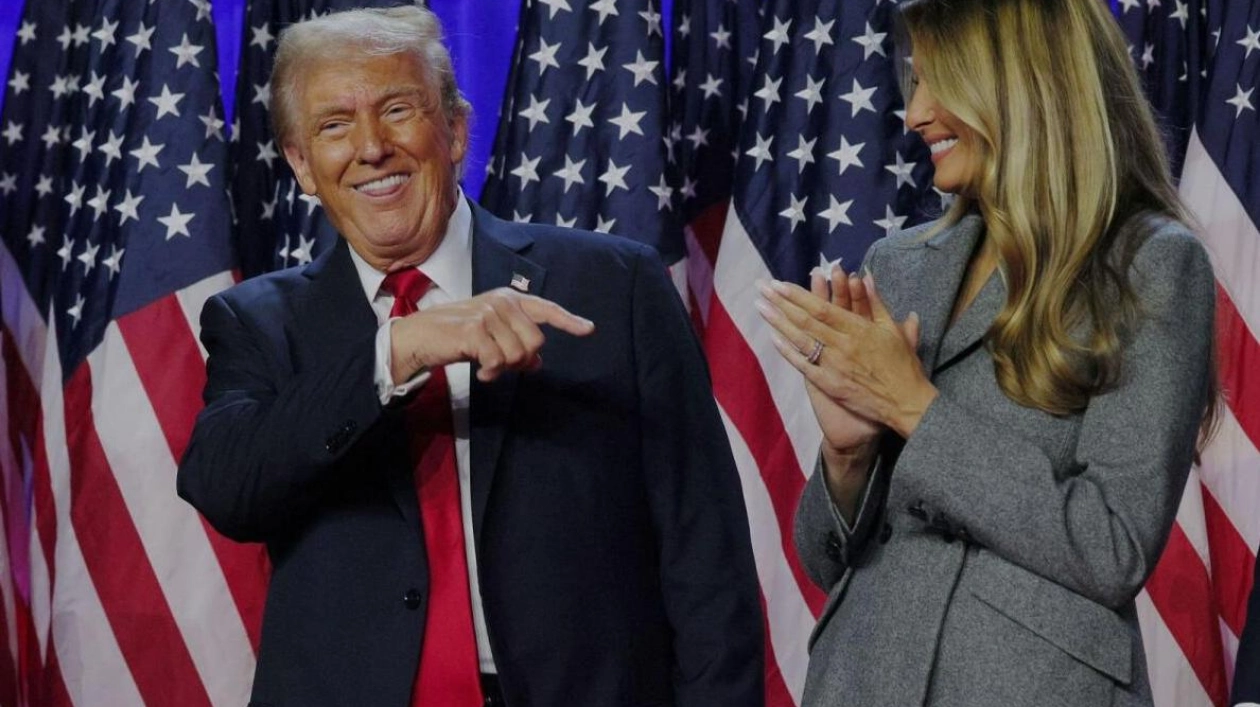Donald Trump gestures towards his wife Melania during an event at the Palm Beach County Convention Centre in West Palm Beach, Florida, on Wednesday. — Reuters
A potential victory for Donald Trump in the presidential election could significantly impact US trade policy, climate change initiatives, the conflict in Ukraine, electric vehicle development, tax policies, and illegal immigration. While some of his proposed policies would need congressional approval, here is an overview of the strategies he has indicated he would implement during a second term:
Increased Tariffs
Trump has proposed a 10% or higher tariff on all imported goods into the US, claiming this would eliminate the trade deficit. Critics argue this would result in higher costs for American consumers and global economic instability. He has also suggested he should have the authority to impose higher tariffs on countries that have levied tariffs on US imports. Trump has threatened to apply a 200% tariff on certain imported cars, particularly targeting those from Mexico. Additionally, he has hinted at increasing duties on goods from allies like the European Union. Trump has specifically targeted China, proposing to phase out imports of electronics, steel, and pharmaceuticals over four years. He also seeks to prohibit Chinese companies from owning US real estate and infrastructure in the energy and tech sectors. Trump views tariffs as a revenue source for the government.
Mass Deportations
Trump has pledged to reinstate policies targeting illegal border crossings and implement sweeping new restrictions. He aims to limit asylum access at the US-Mexico border and initiate the largest deportation effort in US history, likely sparking legal challenges and opposition from Democrats. Trump has mentioned using the National Guard and, if necessary, federal troops to achieve this goal, and has not ruled out establishing internment camps for deportation processing. He has also suggested ending automatic citizenship for children born to immigrants, contrary to the 14th Amendment's interpretation. Trump has hinted at revoking protected legal status for certain populations, such as Haitians and Venezuelans. He plans to reinstitute the 'travel ban' restricting entry from predominantly Muslim countries, which faced legal battles during his first term.
Expanding Fossil Fuel Production
Trump aims to boost US fossil fuel production by easing permitting for drilling on federal land and encouraging new natural gas pipelines. He has proposed reauthorizing oil drilling in the Arctic National Wildlife Refuge in Alaska. Whether the oil industry will increase production amid low oil and gas prices remains uncertain. Trump plans to withdraw the US from the Paris Climate Accords, a framework for reducing global greenhouse gas emissions, and support increased nuclear energy production. He would also reverse President Joe Biden's electric vehicle mandates and other emission-reducing policies. Trump argues that the US needs to enhance energy production to remain competitive in developing AI systems, which require significant power.
Tax Relief
Alongside his trade and energy policies, Trump promises to reduce federal regulations that he believes hinder job creation. He plans to maintain the 2017 tax cuts and has discussed further individual and corporate tax cuts. Trump aims to lower the corporate tax rate to 15% for companies producing in the US. He has suggested ending the taxation of tips and overtime wages to benefit service workers and pledged not to tax or cut Social Security benefits. Trump also intends to pressure the Federal Reserve to lower interest rates without demanding it. Most of his tax proposals would require congressional approval, and budget analysts warn that these cuts could increase the federal debt.
Eliminating Diversity Programs
Trump pledges to require US colleges and universities to 'defend American tradition and Western civilization' and eliminate diversity programs. He plans to direct the Justice Department to pursue civil rights cases against schools engaging in racial discrimination. At K-12 levels, Trump supports programs allowing parents to use public funds for private or religious instruction. He also wants to abolish the federal Department of Education, leaving schooling to the states.
No Federal Abortion Ban
Trump appointed three justices to the Supreme Court, contributing to the overturning of Roe v. Wade's constitutional protection for abortion. He likely would continue appointing judges upholding abortion limits. Trump believes a federal abortion ban is unnecessary and that the issue should be resolved at the state level. He has argued against a six-week ban favored by some Republicans, suggesting exceptions for rape, incest, and the health of the mother. Trump has indicated he would not limit access to the abortion drug mifepristone. He supports policies advancing IVF, birth control, and prenatal care.
Ending Wars
Trump has criticized US support for Ukraine in its conflict with Russia, suggesting he could end the war in 24 hours if elected. He has hinted that Ukraine might need to cede territory for a peace deal, an idea Ukraine has rejected. Trump plans to reconsider NATO's purpose and mission. He supports Israel in its conflict with Hamas but urges it to conclude its offensive. Trump is likely to continue arming Israel and push for normalization of relations with Saudi Arabia. He has also mentioned stopping the suffering and destruction in Lebanon without specifying how. Trump has proposed building an 'iron dome' missile-defense shield over the continental US and sending armed forces to Mexico to combat drug cartels.
Investigating Enemies, Supporting Allies
Trump has pledged to use federal law enforcement agencies to investigate political foes, including election officials, lawyers, and party donors. He has considered appointing a special prosecutor to probe Biden without specifying grounds. Trump has also mentioned firing US attorneys not following his directives, breaking with longstanding US policy of an independent federal law enforcement apparatus. He has considered pardoning those convicted in connection with the Jan. 6, 2021, Capitol attack. Trump has suggested using government regulatory powers to punish critics, such as television networks.
Purging the Federal Bureaucracy
Trump aims to dismantle the 'deep state' – career federal employees he claims pursue their agendas – through an executive order reclassifying thousands of workers for potential firing. This move could face legal challenges. He plans to establish an independent government efficiency panel led by billionaire supporter Elon Musk to eliminate waste in the federal government. Trump would also crack down on federal whistleblowers and create an independent body to 'monitor' US intelligence agencies.
Source link: https://www.khaleejtimes.com






